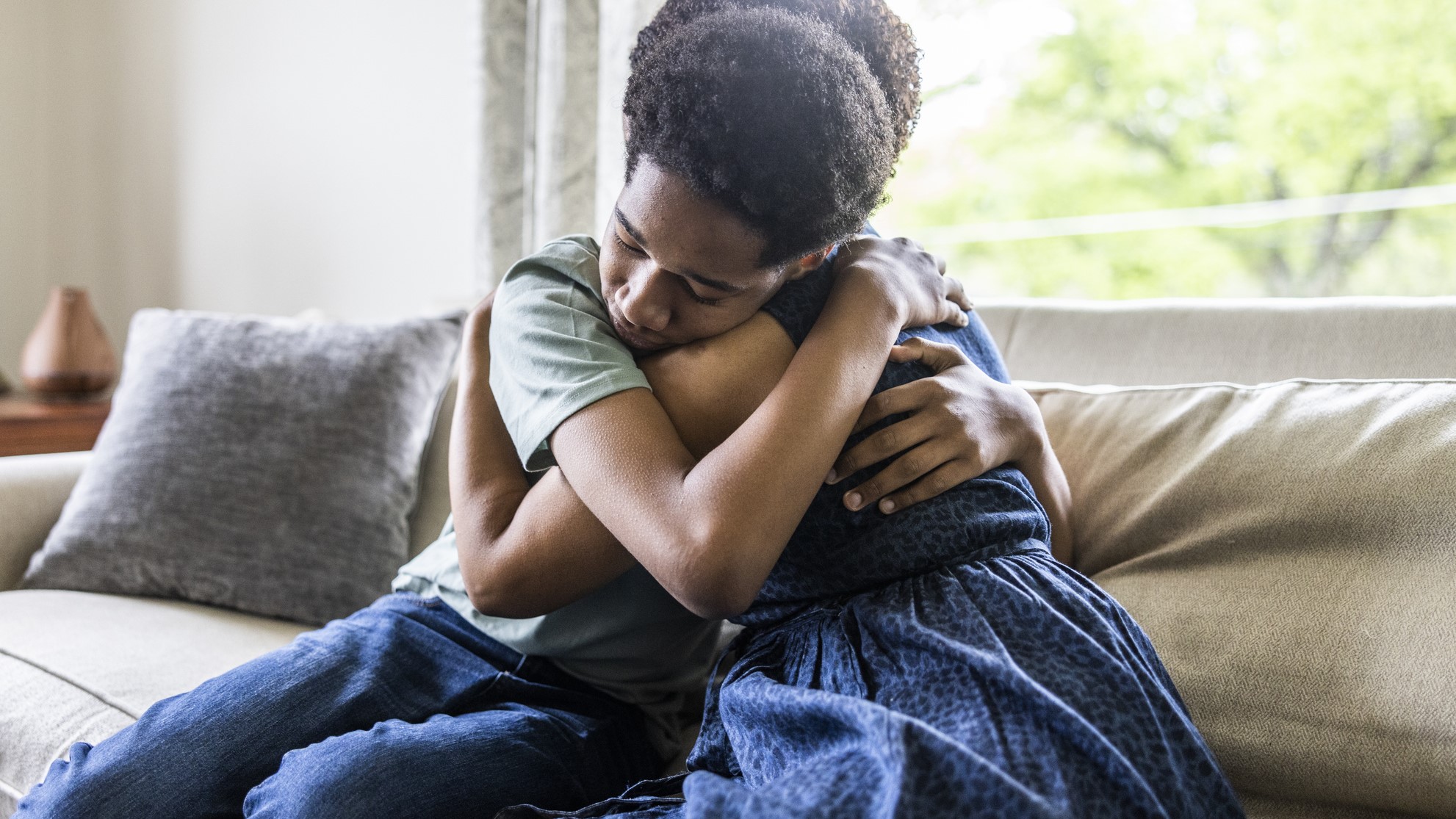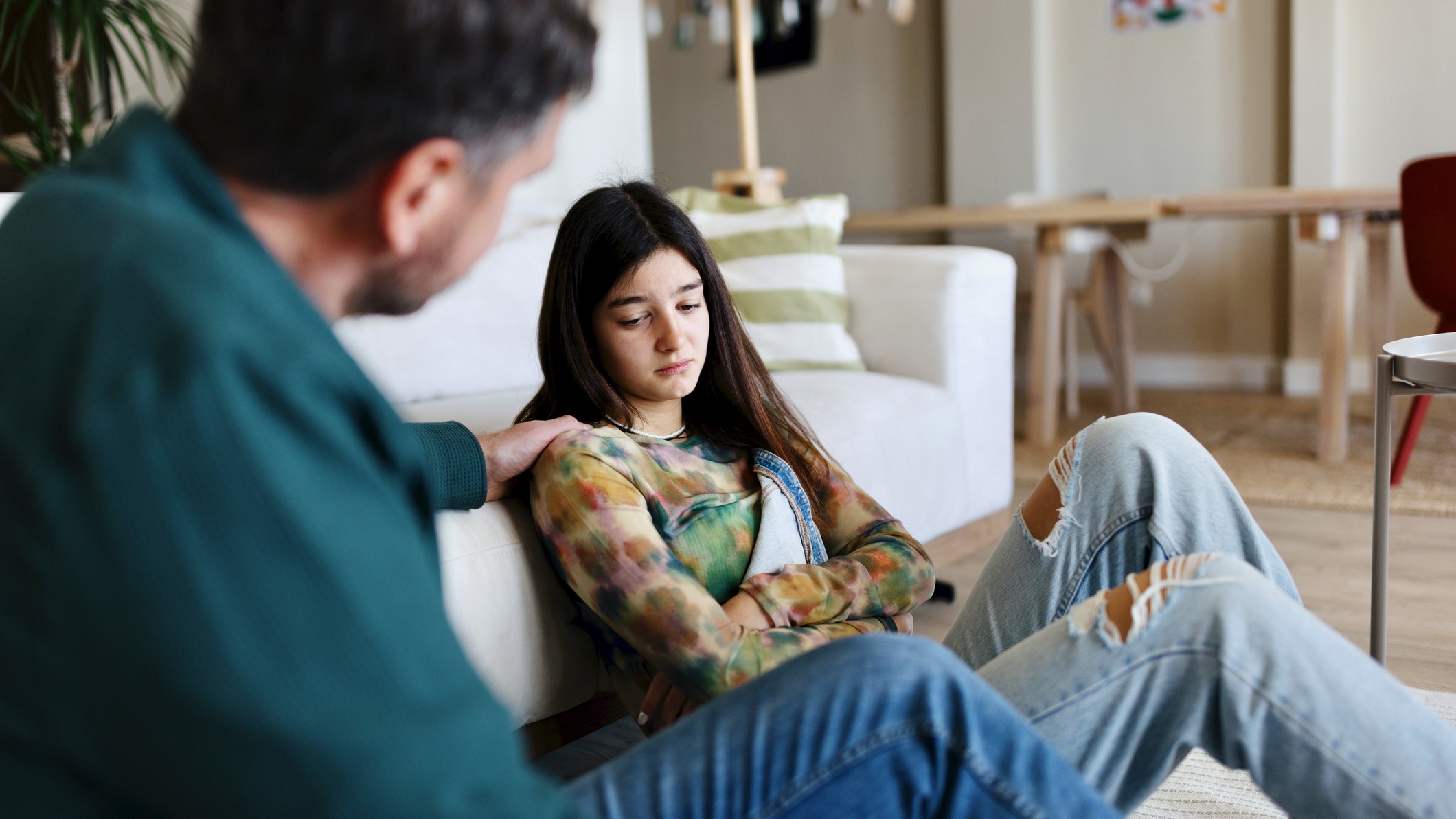Helping your teen with heartbreak - what to do (and 8 things not to say) by a teen development expert
How to support your teenager through a break-up, from what NOT to say to what teens tell us is important


Parenting advice, hot topics, best buys and family finance tips delivered straight to your inbox.
You are now subscribed
Your newsletter sign-up was successful
Parenting expert and author of How to Raise a Teen Sarah Ockwell-Smith writes about why teenagers shut down when they experience a breakup and what parents can do to help support them through their love life struggles.
I was fourteen the first time my heart was broken. I had been with my then-boyfriend for less than a month, but I was convinced it was for keeps. I had visions of the future, our wedding, and practised the signature of my new married name repeatedly on my school books.
I just knew that we would be together forever. In the words of Taylor Swift, “He said he’d love me for all time, but that time was quite short,” although, unlike the title of her song, I couldn’t "Do it With a Broken Heart". In fact, I was miserable. I stopped eating, I stopped talking to friends, and I especially stopped talking to my parents.
The latter is a common complaint I hear from many parents of teens in my work. They ask me, “Why won’t my teen talk to me?” and tell me, “My teen is like a closed book; I can’t get them to open up about anything.”
So, why are so many teens reluctant to talk to their parents about heartbreak or ask for their help to get through tough romantic times? In truth, many of us tend to create an environment where our teens feel uncomfortable discussing their dating woes. We inadvertently diminish their feelings by brushing off their concerns, joking, or teasing them, so it's no wonder our teens don't want to listen to us.
Of course, we all learned to deal with our teens in this way because it’s how our parents raised us. In short, your teen is not keen to talk to you about their love life right now because you didn’t want to open up to your parents when you were a teen.
How to help your teen through heartbreak
I'll be honest there's not much parents can do to heal a broken heart, but you can reassure teens that they are loved, worthy and appreciated. Parents and adults in the teen's life can help them understand that relationships end for many reasons, which doesn’t mean anything is wrong with them.
Parenting advice, hot topics, best buys and family finance tips delivered straight to your inbox.
Just like friendships, some partners are for life, some are for a season, and some only for a week or two. All of these relationships can teach us something. They can all help us learn more about ourselves, which ultimately can help us have healthier and happier relationships in the future. Help your teen to understand relationship red flags (things to avoid in a partner) and green flags (signs of a healthy relationship) and consider what they want moving forward.

Whatever your teen is struggling with, they need you as a parent to be patient, calm, and a good listener. Your response to heartbreak is no different. Indeed, parental warmth is a huge predictor of teen well-being. Heartbreak is a major cause of mental health problems in the teen years, and supporting your young person is vital.
1. Take a pause
One of the best pieces of advice I can give you is to ask your teen, “Would you like me to just listen, or would you like my advice?” All too often, we jump in with advice the minute our teens open up to us, and ironically, despite our best attempts to help, this unwanted advice makes them less likely to open up to us in the future.
Imagine you get home from work and as soon as you finish explaining how someone made you feel small and unimportant at work, your spouse jumps in telling you what you should have done or said. Most people feel unheard and overlooked when this happens, you didn't ask them to fix it, right? This is how a teen can feel.
Listen to understand not to reply. Checking in with your teen right at the beginning of a conversation to see if they actually want your advice or want you to listen puts everything on the right track.
2. Validate your teen's experience
Validating your teen’s feelings is vital. This can sound like letting them know that it’s OK that they are sad, mad, grieving, or angry. All these feelings are OK for them to feel, and they are perfectly justified in feeling this way. Losing somebody you thought was the love of your life is a big deal, no matter how old you are or how long you have been together.
3. Embrace emodiversity
Emodiversity, the acceptance of all emotions, is key to good emotional health at any age, especially during the teen years. Help them to understand that these feelings won’t last forever, but for now, they are strong, and that’s OK. Encourage them to lean into those feelings and respond in the best way for them, from writing their angst down in poetry to painting a picture, writing a song, or thrashing them out in the gym.
4. Provide comfort
Finally, provide plenty of comfort, whether that’s hugs, a comfy blanket, making their favourite dinner, or watching a cheesy childhood film together. Don’t force them out of their room if they don’t feel ready to leave; work at their pace, and tell them you’re always prepared to listen when they feel ready to talk. When they do speak, don’t diminish anything they say, no matter how trivial things may seem to you, to them, it is the big stuff – and if you want them to talk to you about problems that are really big in the future, they need to feel safe telling you everything now.
What to avoid saying to a teen with a broken heart
If you split with a partner as a teen, I can virtually guarantee you heard one of these statements from your parents or carers. For this reason, you will likely find one of these sayings on the tip of your tongue if your teen faces heartbreak. Try hard not to say any of them, though, because they are all highly dismissive of your teen’s feelings. While their relationship may seem trivial to you as an adult, it isn’t to them. In fact, it’s probably the most significant thing in their life right now. Dismissing their pain and their grief is a sure-fire way of teaching them not to tell you about their concerns in the future.
- "There are plenty more fish in the sea."
- "You can do far better than them anyway."
- "They don't deserve you."
- "It's not like it was serious or anything."
- "You're so young; you've got years of dating ahead of you, don't worry."
- "Don't worry; you'll meet someone else."
- "You'll get over it."
- "You're far too busy with school/friends/etc. anyway."
Here's what teens say helped them
While writing my book ‘How to Raise a Teen,’ I surveyed one hundred teenagers. I asked them what their parents said and did, which they found helpful during times of stress and heartache. Overwhelmingly, they told me that they appreciated quiet support, reassurance and love over unsolicited advice or attempts to trivialise a situation. They said things like:
“I appreciate that they will just listen to me rather than give me advice if that’s what I need.”
“I know I can talk to my mum about anything, and she won’t judge me.”
“It’s good to know that I can be myself, and that’s OK.”
“Hugs and chocolate are the best things my parents give me when I’m struggling.”
If we think about being heartbroken teens, remembering the first time we were dumped by our boyfriend or girlfriend or the first time we experienced unrequited love, I think deep down, we all know what to say when our teens are in the same situation. The key is overriding our first instincts (or, as my family calls it, ‘I opened my mouth, and my mother came out’), taking a breath, and putting ourselves in their shoes.
Sarah's recommendations for books, websites and films
- How to Raise a Teen by Sarah Ockwell-Smith
- YoungMinds l Mental health support for young people
- Inside Out (Disney Pixar) l A great example of Emodiversity in action!
Get more advice and support on teenage troubles, from how to make yourself heard if your teen never takes your advice to the real reason your teenager is sleeping in late, Plus, a parenting expert reveals why your teenager’s ‘annoying’ habits are actually a sign of good parenting.

Sarah Ockwell-Smith is a mother of four young adults. She has a background in Psychology and clinical research and has also worked as an antenatal teacher and doula. Sarah has written fifteen childcare books, covering everything from newborns to teenagers, with a special emphasis on ‘gentle parenting’. Sarah regularly contributes to National TV and radio, including Good Morning Britain and BBC Radio 4 and 5, she has also written for national publications including The Guardian, The Express, The Daily Mail, The IPaper and The HuffPost. Sarah lives with her family, two rescue dogs, cats and chickens in North Essex. Sarah's newest book How to raise a teen is due to hit shelves July 4th 2024.